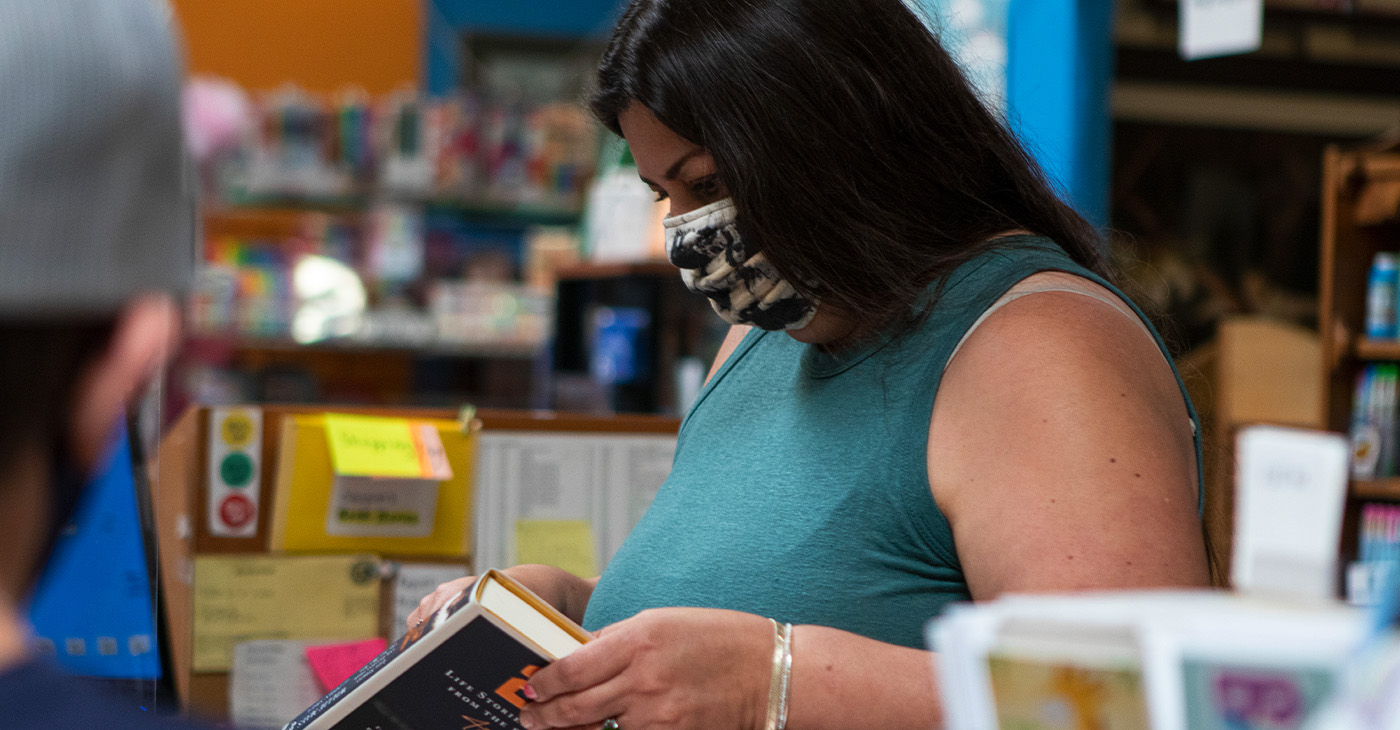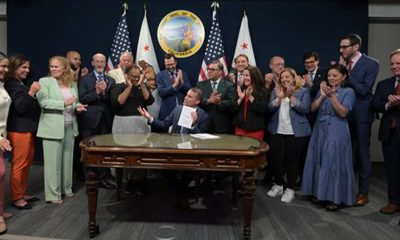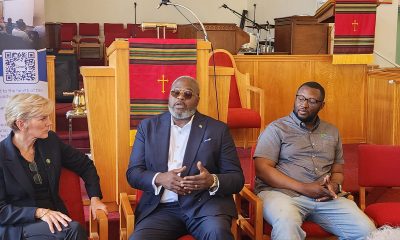Bay Area
S.F. Bay Area Pandemic Recovery Among Worst in U.S.
San Francisco’s recovery from the throes of the COVID-19 pandemic is one of the worst in the country among major metropolitan areas, according to an economic recovery tracker recently launched by the Bay Area Council business group. Among the 25 largest metro areas in the country by regional gross domestic product, San Francisco’s pandemic recovery ranked 24th on the Regional Economic Recovery Index, besting only Baltimore.

By Eli Walsh
Bay City News Foundation
San Francisco’s recovery from the throes of the COVID-19 pandemic is one of the worst in the country among major metropolitan areas, according to an economic recovery tracker recently launched by the Bay Area Council business group.
Among the 25 largest metro areas in the country by regional gross domestic product, San Francisco’s pandemic recovery ranked 24th on the Regional Economic Recovery Index, besting only Baltimore.
San Jose fared better, but is still in the back half of the ranking at 16th. The Austin, Dallas and Denver metro areas have had the greatest recovery to date, according to the Bay Area Council.
Pandemic recovery was measured via 15 different metrics, including local job growth, population growth, office occupancy, labor force growth, sales tax receipts and the construction of new housing.
San Francisco’s recovery ranking includes data from Oakland and Berkeley, while San Jose’s includes data from Sunnyvale and Santa Clara.
“The Bay Area is competing for its economic future and in any competition it’s critical to know where we stand and where we need to invest time, energy and resources to succeed,” said Jeff Bellisario, the Bay Area Council Economic Institute’s executive director.
The Economic Institute developed the index in partnership with the commercial real estate firm CBRE and its Tech Insights Center.
CBRE has regularly tracked office occupancy in San Francisco throughout the pandemic, finding in a report released last month that roughly 27% of the city’s offices were vacant at the end of 2022.
In addition, permanent remote work skyrocketed in the Bay Area between 2019, when between 5% and 10% of workers in counties across the region self-reported that they worked from home, and 2021, when that number is as high as 46% in San Francisco, according to data from the U.S. Census Bureau’s American Community Survey.
San Francisco also ranked last on the index’s measure of economic activity with a score of just 3.2 out of 100, driven mainly by the city’s sales tax revenue falling $96 million from 2019 to 2021. Washington, D.C., was the next closest region with a score of 12.7.
The stark drop in sales tax receipts and passengers boarding flights — the two metrics tracked for economic activity — has also had a cascading effect as the city and local governmental bodies like transportation agencies all face budget issues.
San Jose and San Francisco scored well in just one category — investment — with the San Jose metro area attracting the most venture capital funding of the 25 measured regions. San Francisco ranked eighth, near Philadelphia and New York.
“Macroeconomic uncertainty in the short-term and new challenges related to remote and hybrid office-based work could slow the usual robust, tech-driven economic rebound the Bay Area expects,” said Colin Yasukochi, the executive director of CBRE’s Tech Insights Center.
“This is especially true for urban downtown areas that could benefit from economic incentives and other public sector support,” he added.
The index report is the first of three the Bay Area Council and CBRE plan to issue in the coming months to track regional pandemic recovery, with the next report scheduled for the second half of 2023.
The recovery index can be found at http://www.bayareaeconomy.org/economic-recovery.
EDITORS PLEASE NOTE: An image related to this story can be obtained from the following Bay City News Service web link: https://www.baycitynews.com/images/BCN-20210615-CALIFORNIAREOPEN-001.JPG
/www/bcn/general/02/newsclip.23.02.28.12.51.01.1.txt
Activism
Oakland Post: Week of July 24 – 30, 2024
The printed Weekly Edition of the Oakland Post: Week of July 24 – 30, 2024

To enlarge your view of this issue, use the slider, magnifying glass icon or full page icon in the lower right corner of the browser window. ![]()
Activism
Oakland Post: Week of July 17 -23, 2024
The printed Weekly Edition of the Oakland Post: Week of July 17 -23, 2024

To enlarge your view of this issue, use the slider, magnifying glass icon or full page icon in the lower right corner of the browser window. ![]()
Bay Area
Op-Ed Senate Bill 966 Threatens Health Equity in East Bay
My East Bay community is struggling to get by. A proposed State Senate bill would set us back even further. Serving the East Bay community has been my life’s work and my greatest joy. After leaving the Bay Area to complete my seminary, I returned home to found The Community Church in Oakland. From the outset of my time as the church’s pastor, I have been guided by the belief that my service must extend beyond the pulpit, because the health and economic needs of my community are so great. Our church has organized free food banks, COVID-19 testing clinics, and a housing and re-entry program for those suffering from addiction.

By Rev. Dr. Lawrence E. VanHook
Special to the Post
My East Bay community is struggling to get by. A proposed State Senate bill would set us back even further.
Serving the East Bay community has been my life’s work and my greatest joy. After leaving the Bay Area to complete my seminary, I returned home to found The Community Church in Oakland.
From the outset of my time as the church’s pastor, I have been guided by the belief that my service must extend beyond the pulpit, because the health and economic needs of my community are so great. Our church has organized free food banks, COVID-19 testing clinics, and a housing and re-entry program for those suffering from addiction.
Through my service, I have seen the challenges that our community members are facing. Oakland, my hometown, has the third-highest rate of violent crime in the state. The local economy is strained. Oakland-based businesses are leaving our community because they’re struggling to get ahead.
Both East and West Oakland has disproportionately high rates of respiratory illness due to heavy air pollution. While our local efforts have brought some aid to those in need, we are also counting on our state elected officials to help us address the systemic health disparities afflicting the community.
Chief among the health concerns of community members is having reliable and affordable access to prescription drugs. Equitable access to medications gives us the peace of mind that we can keep ourselves and our families healthy and safe. Our community should not have to choose between paying rent or purchasing prescriptions.
Unfortunately, rather than taking action to combat soaring prescription drug prices, some California lawmakers are pushing legislation that could raise patient costs at the pharmacy counter.
The Legislature is currently considering SB 966, a bill backed by special interests that would undercut the few tools we have to keep prescription drug costs contained, letting big drug companies increase their prices, profiting on the backs of working families – some of whom already live paycheck to paycheck.
SB 966 would target the fundamental programs through which small businesses, unions, and government health programs are able to offer their employees and members quality and affordable healthcare. Millions of Californians rely on these plans to obtain essential medications at the lowest-possible cost.
The bill would make it illegal for employers and unions to incentivize the administrators of their prescription drug plans to negotiate for the lowest possible cost for prescriptions. Right now, small businesses and unions can choose to pay these administrators more for taking on big drug companies and securing discounts – a choice that will be outlawed under this bill.
As a result, employers will have no leverage to stop big drug companies from setting sky-high prices, disproportionately impacting working families.
As these health costs quickly add up, employers will have little choice but to pass the increases down to their employees. That means California patients will see higher healthcare costs and co-pays.
From my perspective, most concerning is that the bill would exacerbate the health disparities impacting my community and other underserved populations. If SB 966 becomes law, the most vulnerable may be forced to skip prescription doses, stop filling their prescriptions, and avoid essential care.
By rejecting this cash grab by big drug companies, our state elected officials can send a clear message that they stand with the community, patients, and working families.
We cannot afford SB 966.
Rev. Dr. VanHook is the founder and pastor of The Community Church in Oakland and the founder of The Charis House, a re-entry facility for men recovering from alcohol and drug abuse.
-

 Arts and Culture3 weeks ago
Arts and Culture3 weeks agoRooted in Tradition: The Intricate History of Black Hair Braiding
-

 Bay Area4 weeks ago
Bay Area4 weeks ago“I Will Not Be Bullied,” Says Oakland Mayor Sheng Thao
-

 Bay Area2 weeks ago
Bay Area2 weeks agoPG&E Increases Rates While Bay Area Households Are Struggling to Stay Afloat
-

 Business3 weeks ago
Business3 weeks agoGov Newsom: Raising Fast Food Minimum Wage to $20 Pays Off as Jobs Multiply in Industry
-

 Activism4 weeks ago
Activism4 weeks agoOpponents of Mayor Sheng Thao Are Calling on Her to Resign Following FBI Raid
-

 Community1 week ago
Community1 week agoHundreds Come to Jehovah’s Witnesses’ Assembly Hall for Three-Day Program of ‘Good News’ in Fremont
-

 Bay Area2 weeks ago
Bay Area2 weeks agoJuneteenth Mass Shooting Suspect Charge with Multiple Counts of Felony Assault by Alameda County DA Pamela Price
-

 Activism4 weeks ago
Activism4 weeks agoOakland Coliseum Sale to AASEG: A Model for Community Development and Inclusion





















































